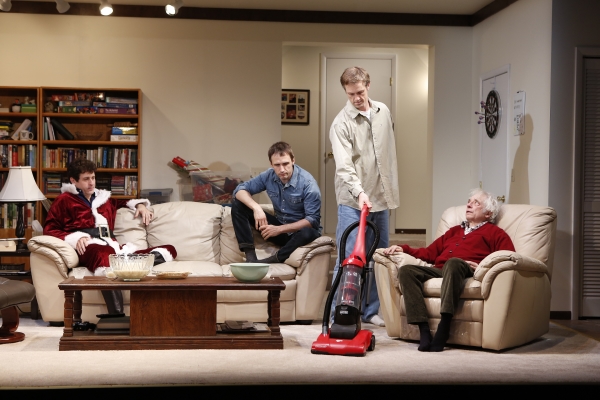Straight White Men

(© Carol Rosegg)
Playwright/director Young Jean Lee is the Madonna of experimental theater, constantly reinventing herself. You could see her 2011 cabaret act We're Gonna Die and her 2012 dance piece Untitled Feminist Show and never know they were authored by the same person. This also applies to Lee's Straight White Men, now making its New York premiere at the Public Theater.
Appropriately, this living room drama about white men takes place in a white living room (designed by David Evans Morris): The carpet is white; the furniture is white; the closets and walls are white. But wait…is that a black nativity scene on the mantel? Perhaps these aren't the straight white men that launched a thousand Internet think pieces about whom you've heard so much.
Jake (Gary Wilmes), Drew (Pete Simpson), and Matt (James Stanley) are adult brothers, returned for Christmas to the home of their father, Ed (Austin Pendleton, playing this role more convincingly than most dads on TV). As they wait for Ed and Matt to arrive with the Christmas tree, Jake (a banker) and Drew (a professor) play a round of "Privilege," a Monopoly board that their parents repurposed to teach their three white sons about the inherent privilege they enjoy in the United States of America. (A typical card in the "chance" pile calls on its holder to pay $200 in reparations for the crime of claiming, "I don't see race.") Seeing the open board game on his coffee table, Ed asks his sons with a chuckle, "How else were you gonna learn not to be assholes?"
But did it work? Now that dad is a widower and Jake is divorced (the other two never married), Christmas has become somewhat of a sausage fest. The three brothers jostle around like overgrown kids, screeching and generally trying to annoy one another. Lee astutely portrays the regression experienced by adults (even those with serious jobs like banker or professor) in the presence of their siblings. Although they look very dissimilar, Wilmes, Simpson, and Stanley's roughhousing exudes a fraternal spirit. They gang up on dad to tease him about his love of Puffins with stupid remarks about their Christmas Chinese food being made from Puffin meat. "I'm worried about you boys. You're not very funny," Ed says with a shake of his head (spot-on timing by Pendleton).
Misplaced worry lies at the heart of Lee's play. Matt bursts into tears in the middle of Christmas dinner. The other men in the house wonder why. After all, Matt is a graduate of Harvard and spent years pursuing a Ph.D. at Stanford. He's the smartest and most charismatic of the three brothers. So why is he living at home with dad, working a temp job? Why is Matt such a loser?
Jake and Drew ask their brother this question, in their own unique ways, until dad finally joins the interrogation. True, he's appreciated the company, but is it really appropriate for a middle-aged man to be living with his dad? Ed thinks Matt's depression might be tied to his crippling student debt. If he can just make that go away, maybe his son will "succeed" in all the ways a straight white man is supposed to.
Lee brutally captures the cruel tyranny of expectations that governs the lives of even the most enlightened, privilege-checking of straight white men. With subtle angst adorned in an ill-fitting T-shirt (costumes by Enver Chakartash), Stanley embodies a man trapped between those expectations and his own happiness. Dad likes his company, so what's the problem? "I didn’t grow up with a sense that I had any options," Ed tells his sons about his life as an engineer and father of three. Maybe his sons don't have much of a choice, either.
Of course, in her exploration of privilege and expectation, Lee conveniently ignores the fact that not all straight white men go to Harvard and Stanford. A vast majority don't have engineer fathers, much less ones willing to wipe away their student debt with the flick of a pen. In fact, quite a few straight white men (particularly those from impoverished rural communities) don't go to college at all.
By cavalierly titling her play to encompass a huge swath of the population (and then only focusing on a privileged minority within that group), Lee completely discounts the experience of millions of lower-middle class and poor straight white men who are not as advantaged as those portrayed onstage. What exactly is their privilege? It shouldn't come as a shock that the character of Matt was developed, partly, in the rarefied halls of Brown University. Perhaps Lee should have titled her show Rich Straight White Men.
Still, we should be grateful that Lee keeps challenging herself as an artist, pushing beyond the trite notion of "write what you know." In doing so, she may not produce the tidiest or most irreproachable of plays, but her work never fails to challenge and inspire.











